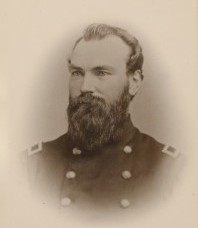Benjamin D. Pritchard facts for kids
Benjamin Dudley Pritchard (born January 29, 1835 – died November 26, 1907) was an important officer in the United States Army. He is best known for leading the Union Army cavalry group that captured Jefferson Davis. Davis was the President of the Confederate States of America. This happened near the end of the American Civil War.
Contents
Early Life and Education
Benjamin Pritchard grew up in Nelson, Ohio. He worked as a carpenter and cabinet maker. He saved enough money to attend Hiram College. There, one of his teachers was James A. Garfield, who later became a U.S. President.
In 1856, Pritchard moved to Allegan, Michigan. He studied law and also taught at Allegan Public Schools. He earned $240 a year. In 1858, he continued his studies at the University of Michigan. He graduated and became a lawyer in 1860. After that, he started a law firm in Allegan.
Serving in the Civil War
In 1862, Benjamin Pritchard joined the Union Army. He became a captain in the 4th Michigan Cavalry. After the Battle of Chickamauga in 1863, he was promoted. He became a lieutenant colonel.
In 1864, Pritchard married Mary Bently Kent. They lived in Allegan. After the war, they settled at 330 Davis Street in Allegan.
The Capture of Jefferson Davis
Lieutenant Colonel Pritchard and his 4th Michigan Cavalry became famous. They were tasked with finding Jefferson Davis. Davis was trying to escape after the Civil War ended. Pritchard's group learned that Davis was moving south towards Irwinville, Georgia.
Pritchard led his regiment on a fast 30-mile ride. They reached Irwinville late at night. They found out they were ahead of Davis's group. One of Pritchard's soldiers, Corporal George Munger, found Davis's camp.
Munger saw two people leaving the camp quickly. They looked suspicious. He stopped them and asked them to remove their cloaks. It turned out to be Jefferson Davis and his wife. Davis was wearing women's clothes to try and hide.
Davis later wrote about the moment he was captured. He tried to escape but was stopped by a soldier. Many cartoons and songs were made about Davis being captured in women's clothing. Even P. T. Barnum made a large model of "Davis in drag."
Pritchard made sure to give credit to all the soldiers who helped with the capture. For his success, Colonel Pritchard was given a special military honor. He was made a brigadier general. He also received $3000 as a reward. This money was offered by President Johnson for Davis's capture.
Life After the War
After the war, General Pritchard returned to Allegan. He continued his law practice until 1868. He and Mary had two children, Bertha Edna and Harry. The family attended the Allegan First Congregational Church.
Pritchard was asked to run for Governor of Michigan in 1884. He decided not to, supporting the current governor instead. He also chose not to run for United States Congress. He preferred to stay on the Allegan School Board, a position he held for many years. However, he did serve two terms as the State Treasurer of Michigan from 1880 to 1884.
As School Board Director, Pritchard helped build three new elementary schools. He also started Allegan's first high school. The first class graduated in 1876.
In 1870, Pritchard started the First National Bank of Allegan. He was its president until 1905. Then, he founded the First State Bank. This bank was the first in the county to offer 4% interest to savers. It was also the first to install safety deposit boxes.
Death and Burial
Benjamin Pritchard started having chest pains in November 1907. On November 26, 1907, he passed away at home. His death was a shock to many people across the state.
Pritchard was buried in Oakwood Cemetery in Allegan on November 29, 1907. Over 600 people attended his funeral.
Legacy
Pritchard's house in Allegan, along with some of his belongings, was passed down through his family. His descendants, Rob and Denni Proctor, and the house were featured on a TV show called If Walls Could Talk.
Documentation
- The Life and Times of General B. D. Pritchard by James J. Green (Allegan: Allegan County Historical Society, 1979)
- Harper's Weekly (May 27, 1865)
- Michigan History Magazine (May/June 2000)


